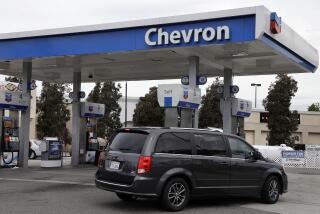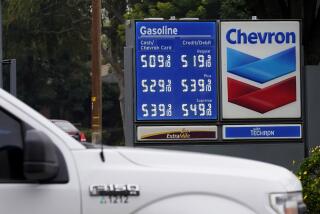Unocal Faces a Difficult Choice
CNOOC Ltd.’s offer to buy Unocal Corp. for $18.5 billion may stoke political fears in Washington, but whether the Chinese company’s bid makes headway will depend on Unocal’s directors and stockholders.
The problem before them: Which is better, $67 or $62? But the board’s decision probably will go beyond whether to simply take the highest price for El Segundo-based Unocal Corp., analysts said Thursday.
CNOOC, China’s third-largest oil producer, made an unsolicited, all-cash offer of $67 a share Wednesday for Unocal’s far-flung worldwide operations, slightly more than two months after Unocal accepted a cash-and-stock bid from Chevron Corp. worth about $62 a share, or $17 billion.
Unocal’s board already has endorsed the Chevron acquisition and told Unocal’s investors to do the same while it reviews the proposal from CNOOC, an arm of government-controlled China National Offshore Oil Corp. Unocal said Thursday that it would immediately begin talks with CNOOC.
Among the factors Unocal’s directors must assess is whether to give more weight to the Chevron deal because it already is in hand -- and already has received U.S. antitrust clearance -- or to wait for a prolonged U.S. review of the CNOOC proposal and risk its possible rejection.
Also, CNOOC might be offering more cash today, but the Chevron deal includes Chevron stock that could rise well above $67 a share in future years, analysts said.
Various court decisions, some stemming from the merger mania of the 1980s, give directors the latitude to turn down a higher price -- especially if one offer includes stock in the acquiring company -- if they believe a rival offer provides more value for their shareholders.
“They’re not bound to just take the highest price,” said Lloyd Greif, president of Greif & Co., a Los Angeles investment bank.
Indeed, this year Verizon Communications Inc. won a three-month bidding war for MCI Inc., beating out Qwest Communications International Inc. even though Qwest offered $9.75 billion to Verizon’s $8.5 billion. MCI’s directors concluded that Verizon was a preferred buyer because of its financial strength and better fit with MCI’s operations.
“We’re satisfied with the bid we have on the table,” Chevron Vice Chairman Peter Robertson told CNBC when asked whether Chevron, based in San Ramon, Calif., was prepared to pay more for Unocal. “We think it’s the best value proposition,” he said, “in part because the CNOOC bid “has a potential time delay.”
Unocal spokesman Barry Lane declined to say when its board would meet to consider the rival bids.
If Unocal’s directors reject Chevron’s agreement and embrace CNOOC’s offer, Chevron might come back with a sweetened bid.
If Unocal’s board stays with Chevron, CNOOC could wage a hostile takeover attempt by letting Unocal’s stockholders decide on their own whether to accept its offer.
Analysts also have speculated that Chevron and CNOOC might combine forces to divvy up Unocal’s assets.
“In the end, three factors will determine the contest winner: the Unocal board of directors, the reactions of the bidders and Unocal shareholders,” Bernard Picchi, senior managing director at Foresight Research Solutions in New York, said in a note to clients Thursday.
Investors had aggressively pushed up Unocal’s stock price in anticipation of CNOOC’s offer, which was announced after U.S. markets closed Wednesday. But the stock rose only 16 cents to $65.02 a share Thursday, with more than 17 million shares changing hands.
Chevron’s stock fell 94 cents to $57.33. CNOOC’s U.S.-traded shares rose $1.84 to $55.15. And oil brought $60 a barrel for the first time in New York futures trading but ended the day at $59.42 a barrel, up $1.33 from Wednesday and 5 cents higher than the previous record set Monday.
Both CNOOC and Chevron covet Unocal because of Unocal’s oil and natural gas properties in the Asian Pacific region and elsewhere overseas. Those foreign assets accounted for about two-thirds of Unocal’s $8.2 billion in 2004 sales.
Some U.S. lawmakers are concerned that a CNOOC purchase could shift more of the world’s scarce supply of oil to China and away from the United States. They also fret that Chinese ownership of Unocal raises national security questions.
CNOOC has framed its offer as friendly and one that is purely commercial, even though most of the financing comes from Chinese entities. For CNOOC, “shareholder value has always been the predominant driver,” Chief Executive Fu Chengyu said Wednesday in a conference call with reporters.
Unocal’s board “has to sell its shareholders on the idea that there are more synergies and long-term value with Chevron, versus taking the money and running with CNOOC,” said Brian Hicks, co-portfolio manager of the Global Resources Fund, a unit of U.S. Global Investors that owns about 50,000 shares of CNOOC but doesn’t own Unocal or Chevron.
But Greif said the CNOOC offer “is limited at $67 a share” for Unocal’s investors, “whereas the Chevron offer isn’t because the Chevron stock component has an unlimited upside.”
Picchi of Foresight Research Solutions said he doubted CNOOC was intimidated by the threat of an exhaustive U.S. review of its Unocal bid. Rather, it might welcome the scrutiny “as a kind of clarifying exercise that will set firm policy regarding Chinese direct investment in the U.S.,” he said.
Other foreign companies, some with government ties, previously have invested in U.S. energy companies.
British Petroleum, now known as BP, bought Chicago-based Amoco Corp. in 1999 and the next year completed the purchase of Los Angeles-based Arco, one of the largest gasoline retailers in Southern California. BP is not state owned.
Venezuela’s national oil company, Petroleos de Venezuela, bought half of Citgo Petroleum Corp., the Houston-based refiner and gasoline retailer, from Southland Corp. in 1986 and bought the rest in 1990.
Saudi Refining, an arm of Saudi Arabia’s national oil company, owns half of a joint venture with Shell Oil Co. that sells Shell and Texaco gasoline at 17,500 service stations in the eastern and southeastern U.S.
Lukoil, Russia’s largest oil producer, operates a network of more than 2,000 gasoline stations from Maine to Virginia. The service stations, which sell under the Mobil and Getty brands, are being converted to the Lukoil name. The Moscow-based company is no longer state owned.
But congressional concern shouldn’t be enough to derail CNOOC’s offer, given U.S. openness to foreign investment, especially in the energy sector, said UCLA law professor Stephen Bainbridge.
“It’s hard for me to imagine that the fact that the bidder is Chinese is going to pose an overt regulatory issue,” he said.
Times staff writers Evelyn Iritani and Elizabeth Douglass contributed to this report.
More to Read
Inside the business of entertainment
The Wide Shot brings you news, analysis and insights on everything from streaming wars to production — and what it all means for the future.
You may occasionally receive promotional content from the Los Angeles Times.











